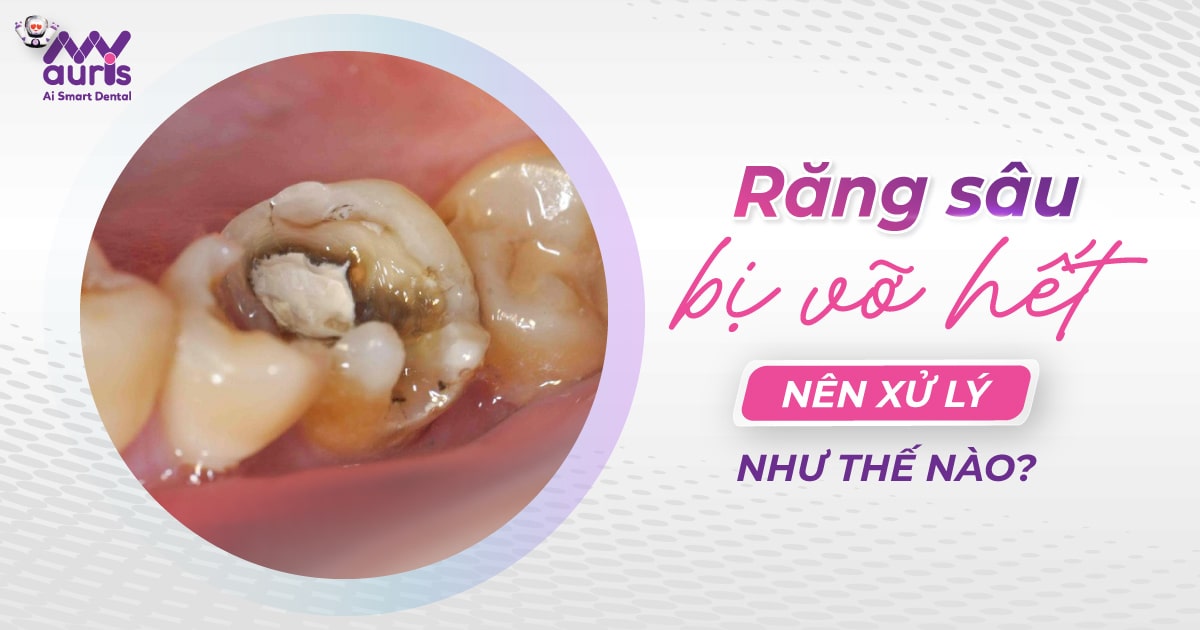Tooth decay is a common dental condition in both children and adults. If not treated promptly, the decay becomes more and more severe, leading to the entire tooth structure breaking, greatly affecting oral and body health. So how shoulda broken tooth be handled? Let’s find out with My Auris dentistry through the following article.
The condition of completely broken teeth
Tooth decay initially appears on teeth as just tiny black spots. If detected promptly and treated, tooth structure is preserved. On the contrary, the dark spots grow larger and form larger cracks.
At the same time, decayed teeth now become brittle and break easily. From there, the bacteria will gradually erode the tooth structure, causing the tooth to break and no longer retain its intact structure.
If this condition occurs over a long period of time, it will cause many dangerous complications for patients with worms. Therefore, as soon as the following symptoms appear, you should go to the dentist/hospital for timely examination and examination:
- Severe tooth pain and sensitivity occur, especially when eating food that is too hot or too cold.
- The gums are swollen and bleeding. When bacteria in the oral cavity multiply, they will not only attack tooth structure but also make the gums more sensitive.
- The toothache does not stop but persists
- The tooth structure is not intact, is cracked and the tooth color turns yellow or brown due to bacterial invasion.
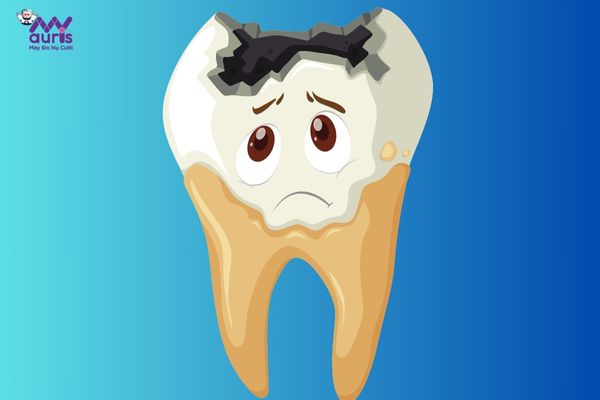
The cause of all decayed teeth
When a decayed tooth is broken, it is accompanied by pain, making people feel uncomfortable and impaired in eating and drinking. Besides this sign, broken teeth also cause many serious consequences. So what is the cause?
- Due to the impact of bacteria: when food containing a lot of sugar and starch remains in the oral cavity for a long time, it will turn into acid that sticks to the tooth wall, causing tooth decay. Over time, they will erode tooth enamel, causing teeth to become brittle and more susceptible to breakage.
Therefore, when there is tAny impact will cause teeth to break quickly. - Dental pulpitis: when the pulp is damaged, the tooth is easily broken and broken, even causing the pulp to die and permanent tooth loss.
- External impacts: when decayed teeth are subjected to many external impacts such as impact and chewing hard foods, they also cause many broken teeth.
- Oral hygiene habits: When the mouth is not cleaned properly, leftover food stuck on the teeth will create an environment for bacteria to invade and multiply, attacking tooth enamel, causing cavities and rapid tooth breakage.
- Other diseases: stomach pain, gastroesophageal reflux with symptoms of heartburn, stomach secretions containing acid cause tooth erosion, causing decay and breakage.
- Eating habits, nutrition: when the body is deficient in nutrients, tooth enamel is more or less deficient, tooth enamel low in minerals will easily break and be attacked by bacteria that cause tooth decay.
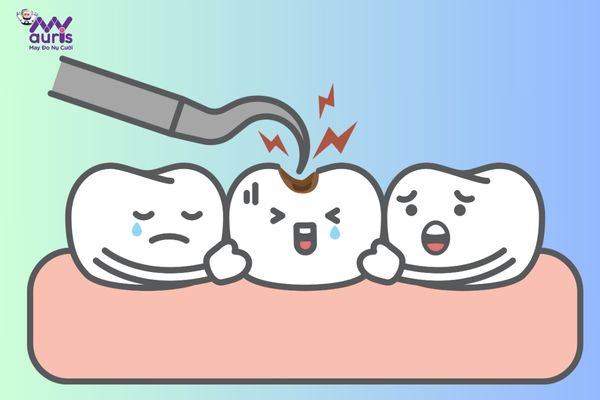
How should all the decayed teeth be treated?
Depending on the level of tooth decay, the doctor examines and prescribes appropriate treatment methods. In cases of mild tooth decay, without much breakage, the doctor will prescribe a filling. For conditions that still have the ability to protect the tooth structure, the doctor will treat the root canal and grind the root of the tooth to cover it with porcelain. For decayed teeth that are completely broken and no longer intact, the doctor is required to prescribe tooth extraction to protect oral health and avoid potential risks later.
After removing all broken decayed teeth, depending on the status, economic conditions and needs of each customer, the doctor advises on appropriate restoration methods, which can be porcelain bridges or implants.
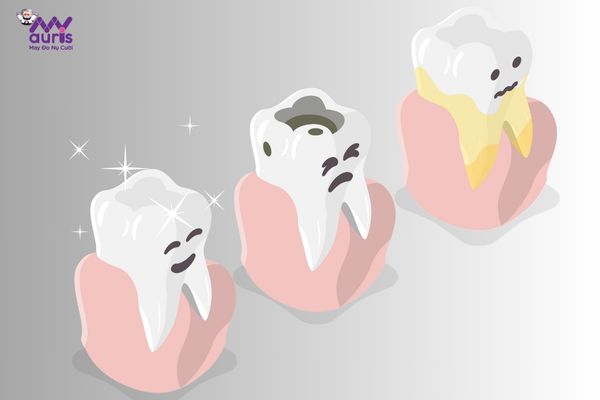
The consequences of not treating a broken tooth end
CommandmentsSevere decay has completely broken down, the structure is no longer intact if not treated, refusing to remove the tooth will cause many other dangerous consequences such as:
Prolonged pain
Tooth pain caused by tooth decay is extremely uncomfortable, the pain is persistent and spreads to the head. Because the dental pulp is where the nerves related to the brain are located. When the tooth structure is lost, the tooth pulp is no longer protected, and bacteria now have the opportunity to directly attack the nerves. Therefore, the pain becomes more and more serious and affects daily activities and work.

Tooth root abscess
Once the tooth has broken off, bacteria will continue to invade Enters the roots of teeth and gums, causing infection. Pus pockets will form at the location of the decayed tooth and can potentially spread to neighboring teeth.
Bad breath
Bacteria in cavities combined with bacteria in the oral cavity cause bad breath. This makes people with tooth decay shy and lose confidence in daily communication, smiling and talking.
Infection
When a decayed tooth is completely broken and the root is not treated promptly, the condition of decay becomes more and more severe. When the nerves in the dental pulp are damaged, it will lead to infection of the tooth, jawbone around the tooth and even jawbone loss.
Effects on neighboring teeth
Severe tooth decay that is not removed will cause tooth decay bacteria to continue to attack and eat into neighboring teeth. This causes the remaining teeth to no longer be strong, decayed, and potentially cause permanent tooth loss.
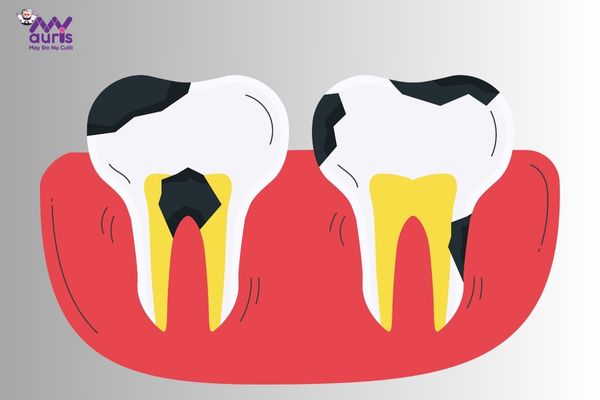
Causes shifting of teeth
Severely broken teeth will create gaps in the arch function. function. From there, the remaining teeth tend to fall into this space, causing jaw misalignment and malocclusion.
Unaesthetic
If teeth are completely broken, they will no longer be intact, causing loss of aesthetics in smiling, speaking, and communicating.
Impaired chewing, affecting digestion. At this time, the body is not only susceptible to nutritional deficiencies but also affects digestion because the food is not chewed or mashed thoroughly before entering the stomach.
Hopefully the information in the article aboutbroken decayed teeth will help people better understand the problem. From there, know how to care for and protect your oral health better. In addition, when even the slightest pain appears, you should see a doctor early to avoid the condition from getting worse. Please contact My Auris dentistry for more detailed advice and answers.
Anh Thy


